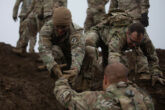November 21, 2019
Attrition and the Will to Fight a Great Power War
A nation’s capability and will to fight are interdependent critical factors in determining military operational success in conflict. The possibility of a kinetic war, however slight, now occupies the minds of policy makers. As great power competition and worry over potential great power conflict (GPC) increases, it is vital to consider the effects of attrition and the demands such conflict would require. The United States’ ability to tolerate manpower attrition and sustain the force in a war against a near-peer competitor is one factor that could determine American will to fight—and ultimate success—in a great power war. Many planners expect conflict to remain in the “grey zone” or the cyber domain with less risk of violence. But what if they are wrong? In the next GPC the nation may be vulnerable to platform and human attrition. The potential of such a conflict ultimately raises questions of the will to fight, reasonable risks, and associated casualties.
Conversations about the military balance tend to focus on projected capabilities and platforms while the need for personnel and possibility of large-scale casualties receive less attention. Planners should seriously consider not just the vulnerabilities of platforms they field but also how mobilization and loss of service members would change national decisions, capabilities, and will to fight. Against a near-peer competitor, what level of attrition can the US tolerate? Will society be willing to engage in a great power war? These are important considerations when assessing US preparedness and should inform talent management, military end strength, and force composition. To understand this argument, one must first consider the context of attrition and then explore the nuances of platform and human attrition.
Read the full article in Strategic Studies Quarterly.
More from CNAS
-
Hegseth Brings the Culture War to Combat
The fundamental challenge of military leadership lies in creating cohesive teams that can work together in an environment of mortal risk and, when called upon to do so, use le...
By Dr. Jason Dempsey
-
Hegseth Says Trump Boosted Military Recruiting. It’s Been Improving for over a Year
Defense Secretary Pete Hegseth says military recruiting has shot up since the Trump administration's return. In fact, it's been improving for at least a year, with big jumps i...
By Taren Sylvester
-
Pete Hegseth’s Views About Women and Military Standards
In recent weeks, Hegseth walked back comments made while promoting his book, where he said women did not belong in ground combat units. Without citing specific examples, he co...
By Katherine L. Kuzminski
-
What Trump’s Pick for Secretary of Defense Could Mean for Inclusivity in the Military
Dr. Kyleanne Hunter, Adjunct Senior Fellow with the Military, Veterans, and Society Program at CNAS joins to discuss the Trump administration nominee for secretary of defense....
By Dr. Kyleanne Hunter




